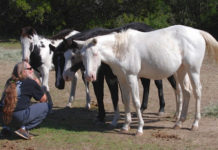As a successful advertising executive, Dan Parker helped companies like Coca-Cola and McDonald’s shift fizzy drinks and fast food. But when diagnosed with type 2 diabetes, he quit ad land. Parker now uses his insight to tackle obesity
“Nobody knows more about what people choose to put in their mouths than those who work with Coca-Cola, McDonald’s. Their knowledge of manipulating emotions? It’s genius.”
Dan Parker should know. He promoted the products of both, plus plenty more global food and drinks brands, during his 25-year career in advertising and marketing. “I’d spent my life with these people, and I was pretty good at it myself,” he says.
But everything changed in 2014, when he discovered he had type 2 diabetes. It was a “slap around the face. But not really a surprise,” says Parker. “I was four stone heavier than I am now, had a sedentary lifestyle, I worked with computers all day and I had a terrible diet.”
He owned a marketing agency and stuck it out for a while post-diagnosis, devising promotions for the likes of Cadbury, Walkers, Tesco and Asda. But the gap between Parker’s work and his growing knowledge of nutrition began to grate. “Briefs would come across my desk at the same time as I was reading books on coping with diabetes. I’d think, ‘Do I really want to do another McDonald’s campaign?’”
The news might all seem bad, but good things are happening too.
He readily admits that he was part of the problem, wrapped up in the “cosy, middle-class, wealthy, Soho bubble”, ignorant to the harm that junk food marketing was doing. “A lot of that was down to arrogance, no question.”
But it began to dawn how he could be part of the solution. By 2016, he had closed his advertising agency and founded Living Loud: a charitable coalition of experts from health, nutrition, digital, PR and advertising. “I realised that if I could take the skill I’ve seen trying to persuade people to drink more Coca-Cola to get people to make healthy choices, then I might be able to change the world.”
Living Loud makes and advises on campaigns that promote healthier living, trying to tackle the root causes of non-communicable diseases like heart disease, strokes and diabetes. Already, Parker’s team has worked with the Children’s Food Campaign and the Advertising Standards Authority to define new regulations to ban junk food advertising online and has teamed up with groups such as Action on Sugar, the Obesity Health Alliance, Cancer Research UK and Jamie Oliver Foundation, helping them understand the thinking of global junk food giants and hone their own messaging.
I’d think, ‘Do I really want to do another McDonald’s campaign?’
Most recently, Parker has joined forces with The Food Foundation, Hugh Fearnley-Whittingstall, Jamie Oliver, and leaders from agriculture, industry and advertising on a campaign to glorify vegetables. The government’s 5 A Day campaign failed, suggests Parker, because it demonised veg. He hopes to launch a fund to use marketing and advertising to positively encourage more of us to eat more of the good stuff.
His biggest bugbears in food and drink advertising? The intense concentration of junk food advertising during early evening ‘family viewing’ TV is one. Slathering the packets of high-sugar cereals in…










